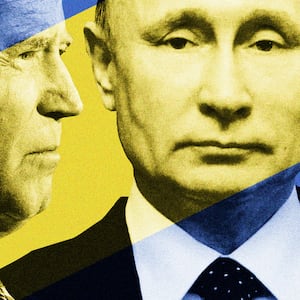LONDON—The main aim of President Biden’s European tour this week has simply been to show that the United States “is back!” at the heart of the Western diplomatic consensus.
Unfortunately, the world is a little more complicated than that. By Saturday night in England, it was beginning to look like the White House had been a touch over-confident in just how far the charms of Biden would take him in persuading other G7 leaders to swallow all of his policy positions. Even though he isn’t Donald Trump.
The president tried to cajole his colleagues to sign a joint statement calling out China directly for forced labor practices in Xinjiang province where the Muslim Uighur minority has been targeted by Beijing. It was not a roaring success.
The White House’s own spin conceded as much in characteristically diplomatic language. “There is a little differentiation, I think I would say, within—within, I think, the spectrum of how hard they would push on some of these issues,” a senior Biden administration official said in a briefing to reporters.
Reports from inside the room went further with claims of a sharp divide between the leaders over whether China should be called out explicitly. “The disagreements, aired during a session that at one point became so sensitive that all internet was shut off to the room, pitted European nations against the United States, Britain and Canada,” according to a CNN report on the meeting.
The senior White House official said Biden “really was leading the charge… And I would say Prime Minister [Boris] Johnson was very close behind him.”
It remains to be seen if the old Anglo-Saxon alliance—backed up by Canadian Prime Minister Justin Trudeau—will succeed in persuading the mainland European contingent and Japan to go along with some kind of statement condemning China in a joint communiqué that will be published on Sunday.
These kind of negotiations are often hammered out in advance of the meetings between the leaders, which are usually more of a photo opportunity.
President Emmanuel Macron of France did raise the alarm last week, warning Washington that Europe did not follow Biden’s apparent desire to “return to [the logic] of the Cold War” with China cast as the West’s new foe.
He insisted that Europe would retain its independence when it came to building a relationship with China, with a policy that is “neither to be vassalized by China nor to be aligned on this subject with the United States of America.”
Biden was more successful in winning support for the idea of a new, green version of China’s “New Silk Road.”
The Build Back Better World initiative is designed to offer developing nations an alternative source of funding and loans for infrastructure projects like that currently being offered by China.
Critics of China’s massive global investments—currently being accessed by around 100 nations—claim that they deliberately trap developing nations in debt, which buys them huge influence over local governments all over the world.
The Trump administration had also talked about setting up a Western alternative to this Chinese funding supply, but it never delivered real money. It is too early to say whether the G7 version will be backed by the kind of investment to make it a real alternative to China’s trillions of dollars.
Haggling over the finer points was set to continue on the beach in Cornwall on Saturday night while the leaders enjoyed grilled lobster and hot buttered rum.







